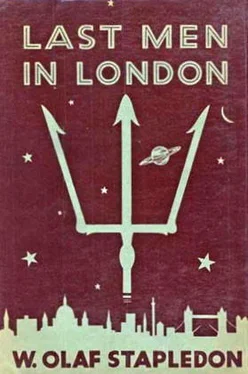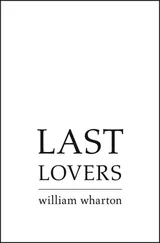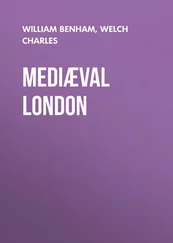The religious folk, who should have been society’s red blood-corpuscles, transfusing their spiritual treasure into all its tissues, had settled down to become a huge proliferating parasite. Mostly of the middle class, they projected their business interests into another world by regular payments of premiums on an eternal-life assurance policy; or they compensated for this world’s unkindness by conceiving themselves each as the sole beloved in the arms of Jesus, or at least as a life member in the very select celestial club. But some, teased by a half-seen vision, by a conviction of majesty, of beauty they knew not whereabouts nor of what kind, were persuaded to explain their bewildered ecstasy by ancient myths and fantasies. For the sake of their bright, featureless, guiding star, they believed what was no longer credible and desired what it was now base to desire.
The scientists, so pious toward physical facts, so arch-priestly to their fellow-men, were indeed a noble army of miners after truths; but they were imprisoned in deep galleries, isolated even from each other in their thousand saps. Daily they opened up new veins of the precious metal; and sent the bright ingots aloft, to be mortised into the golden temple of knowledge, with its great thronged halls of physics, astronomy and chemistry, biology and psychology; or to be put to commercial use, whether for the increase of happiness, or for killing, or for spiritual debasement, or to be instrumental in one way or another to the achievement of pure cognizance. Two kinds of scientists Paul found. Some were but eyeless cave-reptiles, or moles who came reluctantly into the upper world, nosing across men’s path, concealing their bewilderment under dust-clouds of pronouncements. Some, though innocent of philosophy, ventured to set up metaphysical edifices, in which they repeated all the structural defects of the old systems, or were sent toppling by the dizzying of their own unschooled desires, whether for the supremacy of mind, or for the immortality of the individual. The public, tricked by the same unschooled desires, applauded their acrobatic feats, and was blind to their disaster. Others, more cautious, knew that all scientific knowledge was of numbers only, yet that with the incantation of numbers new worlds might be made. They were preparing to take charge of mankind, to make the planet into a single well-planned estate, and to re-orientate human nature. But what kind of a world would they desire to make, whose knowledge was only of numbers?
But the philosophers themselves were scarcely more helpful. Some still hoped to reach up to reality (which the scientists had missed) by tiptoeing on a precarious scaffold of words. Others, preening their intellectual consciences, abjured all such adventures. They were content merely to melt down and remodel the truth ingots of the scientists, and to build them together upon the high, the ever-unfinished tower of the golden temple; Some were so in love with particularity that they ignored the universal, others so impressed by the unity of all things that they overlooked discreteness. Yet doubtless by exchange of findings and by mutual devastation they were year by year approaching, corporately, irresistibly, but asymptotically, toward a central truth; which lay ever at hand, yet infinitely remote, because eternally beyond the comprehension of half-human minds. For, like their fellows, the philosophers of the species had a blind spot in the centre of the mind’s vision, so that what they looked at directly they could never see. Like archaeologists who lovingly study and classify the script of a forgotten language but have found no key to its meaning, the philosophers were wise chiefly in knowing that whoever claims to interpret the rigmarole of half-human experience is either a fool or a charlatan.
There were the artists, despisers of the mere analytical intelligence. What hope lay with them? Microcosmic creators, for whom love and hate and life itself were but the matter of art, in their view the whole meaning of human existence seemed to lie solely in the apprehension of forms intrinsically ‘significant’, and in the embodiment of visions without irrelevance. Athletes of the spirit, by the very intensity of their single aesthetic achievement they were prone to cut themselves off from the still-living, though desperately imperilled world.
There were others, artists and half-artists, who were leaders of thought in Paul’s day, publicists, novelists, playwrights, even poets. Some still preached the Utopia of individuals, the private man’s heaven on earth, ignorant that this ideal had lost its spell, that it must be sought not as an end but as a means, that it must borrow fervour from some deeper fire. Some affirmed, pontifically or with the licence of a jester, that all human endeavour expresses unwittingly the urge of some cryptic, evolving, deity, which tries out this and that organic form, this and that human purpose, in pursuit of an end hidden even from itself. Some, ridiculing all superstition, declared existence to be nothing but electrons, protons, ethereal undulations, and superstitiously asserted that cognisance, passion and will are identical with certain electrical disturbances in nerve fibres or muscles. Some, zestfully proclaiming the futility of the cosmos and the impotence of man, cherished their own calm or heroic emotions, and deployed their cloak of fortitude and flowing rhetoric, mannequins even on the steps of the scaffold. Some, whose sole care was to avoid the taunt of credulity, and the taunt of emotionalism, fastidiously, elegantly, shook off from their fingers the dust of belief, the uncleanness of enthusiasm. Some, because reason (jockeyed and overpressed by so many riders) had failed to take her fences, condemned her as a jade fit only for the knackers; and led out in her stead a dark horse, a gift horse whose mouth must not be inspected, a wooden horse, bellyful of trouble. Some, gleefully discovering that the hated righteousness of their fathers drew its fervour from disreputable and unacknowledged cravings, preached therefore that primeval lusts alone directed all human activities. Some, because their puritan mothers dared not receive the revelation of the senses, themselves wallowed in the sacred wine till their minds drowned. Some were so tangled in the love of mother, and the discord of mother and mate, that they received from woman not nourishment, not strength, but a sweet and torturing poison, without which they could not live, by which their minds were corroded. Some, exquisitely discriminating the myriad flavours and perfumes of experience, cared only to refine the palate to the precision of a wine-taster; but registered all their subtle apprehensions with a desolate or with a defiant conviction of futility, a sense of some huge omission in the nature of things or in man’s percipience. Some cognized their modern world but as flotsam gyrating on the cosmical flux, a film or ordure in which men and women swam spluttering, among disintegrated cigarette-ends, clattering cans, banana skins, toffee papers, and other disused sheathings. For them filth was the more excruciating by reason of their intuitions of purity violated, of austerity desecrated. Others there were, no less excruciated, who nevertheless by natatory prowess reached the mud-flats of old doctrine, whereat last they thankfully reclined, ‘wrapped in the old miasmal mist’, and surrounded by the rising tide.
What was the upshot of Paul’s whole exploration? For me there issued in my own mind the pure, the delighted cognizance, both of Paul’s world and of Paul himself, the appraising organ that I had chosen. For Paul the upshot was a sense of horror and of exaltation, a sense that he was participating in a torrent of momentous happenings whose final issue he could but vaguely guess, but whose immediate direction was toward ruin.
Читать дальше












